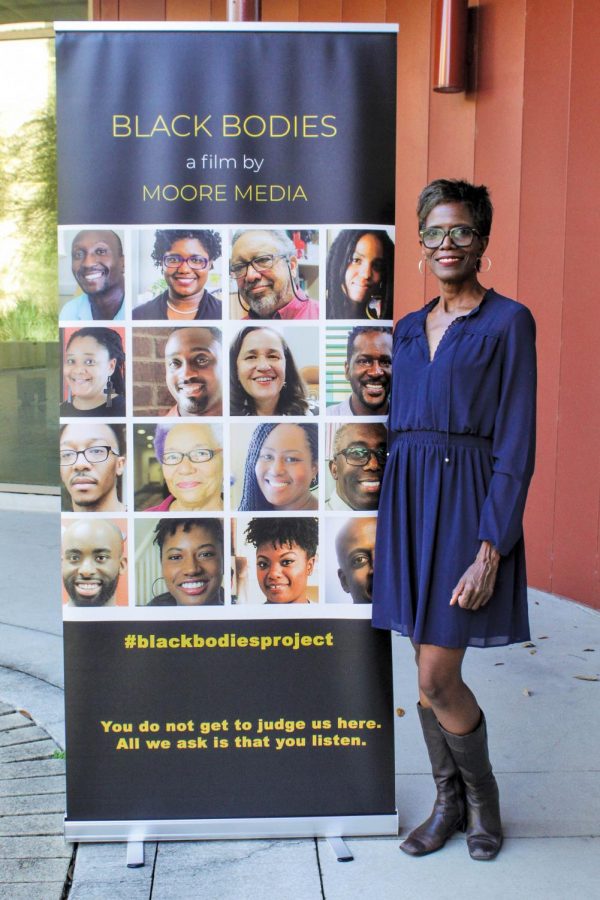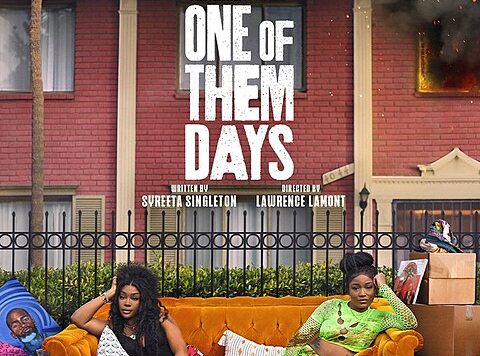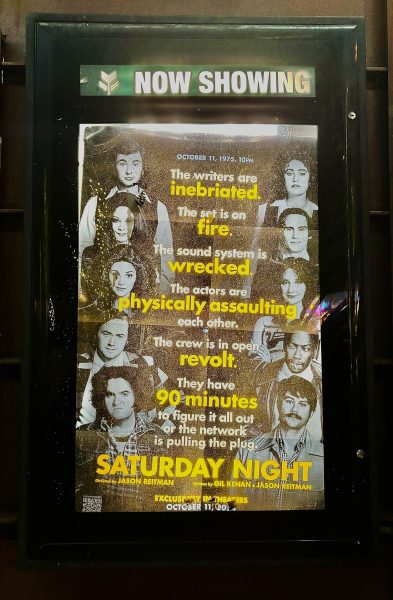Black Student Alliance screens film exploring African-American identity
Charlotte Moore poses by the ‘Black Bodies Project’ poster. This is Moore’s first film.
St. Edward’s University’s Black Student Alliance hosted a screening of “Black Bodies,” a film by Moore Media last weekend. The film showcases the lives of 16 black people from the Austin area of varying ages, backgrounds, religions and skin tones in an attempt to learn what it means for them to exist in their black bodies.
Sydney Mitchell, a senior at St. Edward’s University and vice president of BSA, helped facilitate the screening. She commented on how important it is that the organization hosts a film such as this one.
“I don’t think we talk about the influence that the black community has in Austin and how that’s slowly being erased,” Mitchell said.
The number of black people that make up the Austin population is only 7.34 percent of the total city population, according to census data.
The film, which was an official selection for the 2018 Capital City Black Film Festival, the 2018 Lost River Film Festival and the 2019 San Diego Black Film Festival, was directed and produced by Charlotte Moore. Moore is a local multimedia journalist born and raised in Austin. This is her first film.
Moore didn’t set out originally to make a film. She simply wanted to interview people about their experiences. She feels she was called to bring awareness to black people who live in the city.
“The reason I’m doing this is because the data shows us that in every system in the country, every single system—healthcare, education, economy, any system you name—black people have the worst outcomes,” Moore said. “And in a lot of those cases, experts don’t know any other reason for that to be other than the fact that they are black,” she added.
After the film, Moore conducted a Q&A session with the help of Preston Achilike, one of the 16 individuals the movie follows. Achilike is a Spanish teacher and middle school coordinator of equity and inclusion at St. Stephen’s Episcopal School here in the city. In the film, Achilike speaks about growing up in America with immigrant parents from Nigeria.
“I think for a lot of us that were interviewed, we were just really interested in telling our story and sharing our experience,” Achilike said. “I didn’t really know what to expect. We [he and Moore] just had a mutual connection.” This influenced his decision to be a part of the production.
“This film is for white people,” according to Caroline Alexander.
Alexander is one of Moore’s associates and an advocate for the film. Before seeing the film, she noted that she didn’t know what it was like to be in a black body and was surprised that even her close black friends didn’t talk to her about their experiences.
Other members of the audience joined Alexander in praising the production. Brittini Flatley, who comes from a family of mixed ethnic background, disclosed her struggles with self identity as a youth, as she went to a predominantly white school in Chicago.
“I think films like this are really important for people to realize that we are all fundamentally the same, but we all have struggles,” Flatley said.
“Black Bodies” isn’t the end of this project for Moore. The film is a part of a multifaceted plan called #blackbodiesproject. Other elements of the project include: a weekly interview series called “Brainstorm Black” with a member of the Austin community that is working to improve the lives of black people, and a book titled “Benevolence in Black,” which is designed to be an extension of the film through photographs, poetry and art set to be released this summer.











